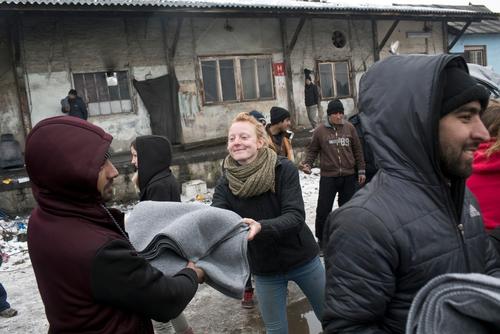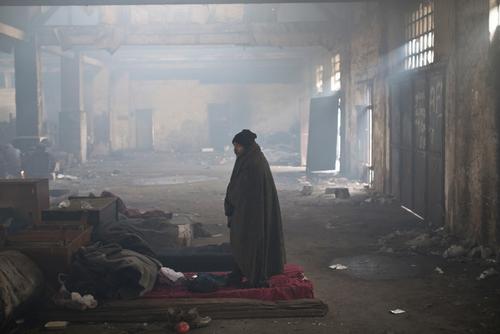After being frozen out by European migration policies, thousands of migrants and refugees now find themselves trapped in freezing conditions in shelters that are ill-adapted for winter in Greece and the Balkans. The cynical neglect of European States' policies, compounded by icy temperatures and a lack of preparation for winter have worsened an already unbearable situation for thousands of men, women and children seeking protection in Europe.
The situation is particularly concerning for those stuck on the Greek islands, living in tents in overcrowded camps and for those stranded in abandoned buildings in Belgrade or still trying to cross the Balkan borders. MSF has repeatedly called on the authorities in Greece and the Balkans to improve conditions in time for winter.
"With the EU-Turkey deal and the official closure of the Balkan route, the EU has decided to turn the entire region into its own gatekeeper, in a bid to stem the flow of people seeking protection from some of today's most active war zones," declares Stefano Argenziano, MSF's operations coordinator on migration. "Today, people are severely lacking appropriate assistance and this is putting their lives in danger. We are witnessing the most cruel and inhumane consequences of European policies, used as a tool to deter and victimise those who are only seeking safety and protection in Europe."
Serbia
Humanitarian assistance restricted amid freezing temperatures

More than 7,500 people are currently stranded in Serbia, living in overcrowded camps and informal settlements. The country has agreed with the EU to host up to 6,000 people, of whom only 3,140 live in facilities adapted for winter. In Belgrade, around 2,000 young people, mainly from Afghanistan, Pakistan, Iraq and Syria are currently sleeping in abandoned buildings in the city centre, whilst temperatures plummet to as low as -20°C. In recent months, Serbian authorities have severely restricted the provision of humanitarian assistance to these people, only tolerating volunteers doing a basic distribution of blankets and food. "For months, the strategy has been to block humanitarian aid to push these people into official camps. But the camps are full and are already stretched beyond capacity, so today people are left with no other option than to sleep in abandoned buildings in freezing temperatures," says Stephane Moissaing, MSF's head of mission in Serbia.
MSF has installed some emergency heaters to try to protect people from the cold, and is currently negotiating with authorities to further increase the shelter capacity. "For months we have called on the EU, the UNHCR and Serbian authorities to put in place long-term solutions to avoid this catastrophic situation. The collective failure of these institutions has left even the most basic needs unmet, exposing already vulnerable people to even more suffering. Several have already died of hypothermia at the borders of Serbia and Bulgaria”.
Greece
Thousands blocked on prison islands in snow and freezing rain
The situation is no better on the Greek islands where thousands of people are stuck in overcrowded camps, living in flimsy tents in sub-zero temperatures. "These families are paying the price of European cynicism and the reprehensible deal with Turkey," says MSF's head of mission in Greece, Clement Perrin. "It is outrageous to see that despite all European promises and announcements, men, women and children are living in tents under freezing rain. We call on Greek authorities and the EU to enact emergency measures immediately to ensure that all refugees and migrants on the islands are housed in dignified living conditions."
The overcrowding and severe lack of winter preparedness is creating health and safety risks for the people living in Greece. In recent months, the majority of people MSF psychologists have seen on Samos and Lesvos for mental health consultations cite poor living conditions as being either the cause or an exacerbating factor in their psychological difficulties. "Greek authorities must stop congratulating themselves on humanitarian achievements while thousands of people are left to suffer as they wait for their asylum claims to be processed. No person seeking protection, fleeing war, torture and extreme violence should be left out in the cold," concludes Perrin.



